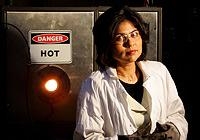Greening the world's iron and steel plants
Global warming caused by human economic activity is real, and industry must respond, according to one of the world's most senior industrial executives at an international conference co-hosted by UNSW.
Global warming caused by human economic activity is real, and industry must respond, according to one of the world's most senior industrial executives at an international conference co-hosted by UNSW.

Global warming caused by human economic activity is real, and industry must respond, according to one of the world's most senior industrial executives, in Sydney to deliver the keynote address at an international conference co-hosted by UNSW.
Mr Louis Schorsch, President and CEO (Flat Carbon Americas) of the multinational steel-making giant, ArcelorMittal, delivered the keynote speech at the recent International Conference on Sustainable Ironmaking, co-hosted by UNSW (Professor Veena Sahajwalla) and Kyoto University (Professor Masanori Iwase). Major steelmakers from Australia, Asia and Europe also attended.
ArcelorMittal produces about 10 per cent of the world's steel, and turned over more the US$100 billion last year.
"There still certainly is a debate and there are companies that would say the science is not proven," Mr Schorsch said of the contribution of industrial development to climate change.
"But, I think it is very clear there is something going on here...we are causing it, and the implications are so potentially bad and so significant that we need to do something about it."
The two-day conference focused on innovative, cleaner energy sources for iron-making, the first step in steel production. Steelmaking accounts for about 3 per cent of the world's greenhouse gas emissions.
Waste wood and a range of industrial and consumer wastes, including used tyres and even synthetic fabric offcuts, are being investigated as potential energy sources to reduce coal and coke consumption in iron making. Both plastic waste and wood burn cleaner than coal, and cut carbon dioxide emissions because emissions are partly made up of water vapour.
UNSW and Australian steelmaker, OneSteel, are in the process of commercialising a new technology that has the potential to use significant amounts of recycled plastic and rubber tyres in making steel. Called the Polymer Injection Technology, it allows electric-arc steelmakers to substitute a portion of typical Electric Arc Furnace (EAF) carbon injectant (Coke) with polymers including plastic or rubber. The technology, which boosts steel making productivity and cuts power consumption, is the result of an intensive three-year development and testing program, made possible by the close collaboration between UNSW and OneSteel.
ArcelorMittal's Mr Schorsch said this kind of research was paramount for emissions reduction, and global industries had to acknowledge that best environmental practices, such as industrial recycling, required substantial financial investments.
UNSW's recently established a Centre for Sustainable Materials Research and Technology (SMaRT@UNSW) headed by Professor Veena Sahajwalla, which brings together world class researchers in materials and industrial sustainability; turning one industry's waste into a resource for another industry.
Media Contact: Louise Williams | +61 (0)407 061 209 | louise.williams@unsw.edu.au